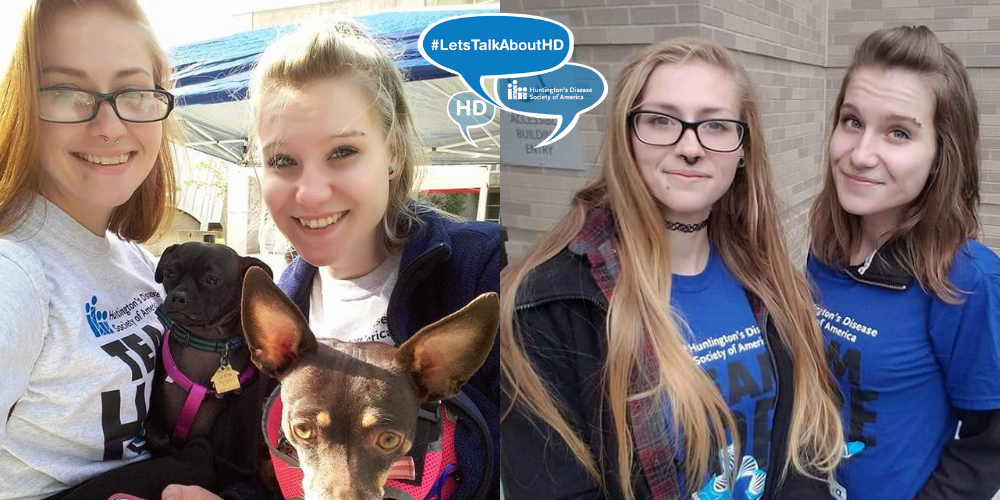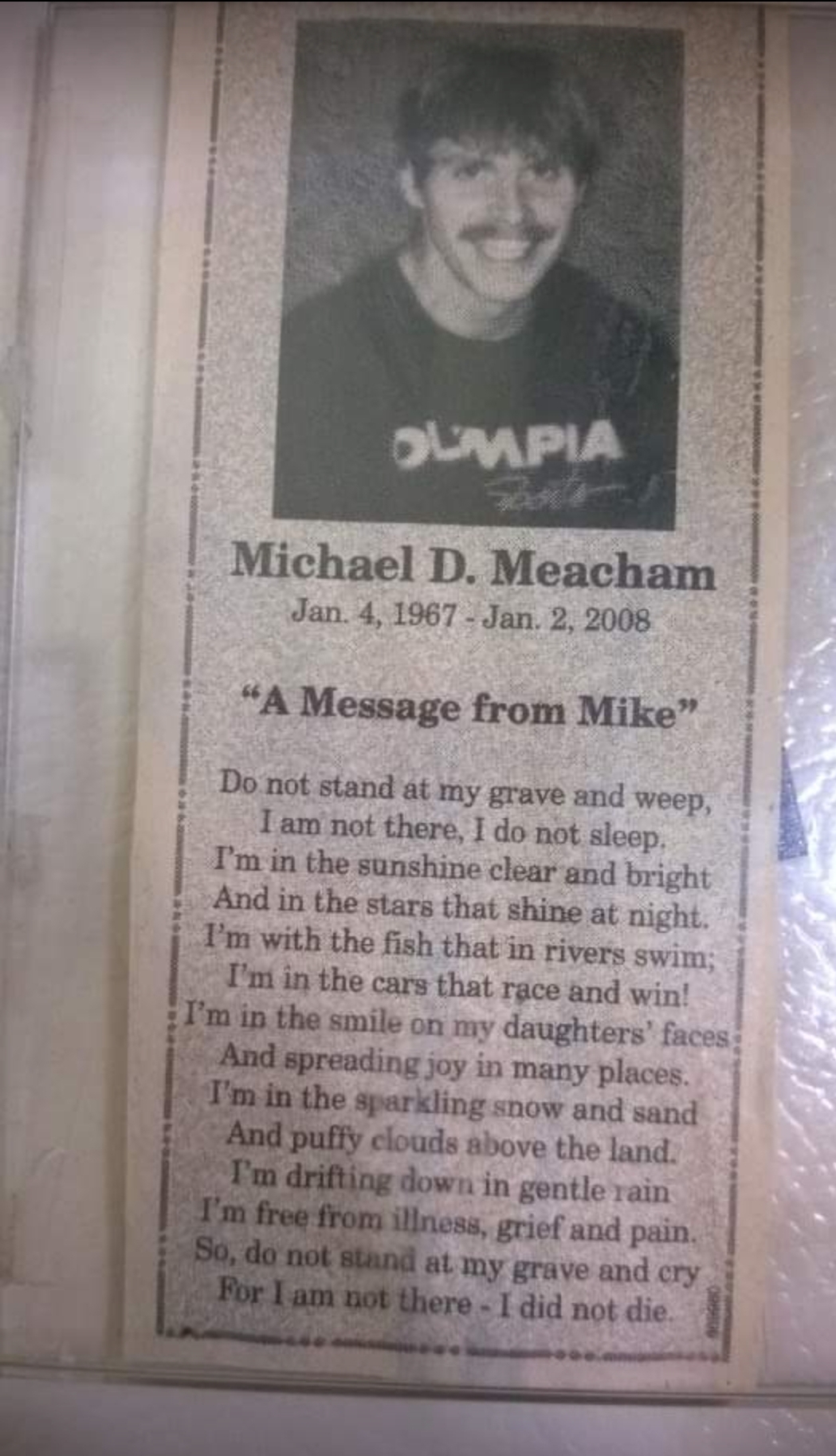
By Matthew Santamaria (msantamaria@hdsa.org)
NOTE: The following story discusses the topic of suicide. If you are feeling suicidal or have suicidal thoughts, visit the National Suicide Prevention Lifeline or call 988.
At 10-years-old, New Hampshire resident Kaylie Meacham witnessed Huntington’s disease (HD) firsthand with her father.
HD is a fatal genetic disorder that causes the progressive breakdown of nerve cells in the brain. It deteriorates a person’s physical and mental abilities during their prime working years and has no cure.
The symptoms of HD are described as having ALS, Parkinson’s, and Alzheimer’s – simultaneously. Symptoms include personality changes, mood swings, depression, forgetfulness, impaired judgment, unsteady gait, involuntary movements, slurred speech, difficulty in swallowing, and significant weight loss.
“I remember my father had difficulty walking and talking,” said Kaylie.
In 2008, her father had pneumonia and was placed in the hospital. He later passed away.

However, the HD battle is not over yet as Kaylie and her older sibling are at risk. Every child of a parent with HD has a 50/50 chance of inheriting the faulty gene.
At a young age, Kaylie moved with her mother to Montana as her mother remarried.
“At 14-years-old, I started to experience anxiety and depression,” Kaylie explains. “My relationship with my mother and her partner was difficult. I was grounded a lot and left alone.”
At 16-years-old, Kaylie attempted to take her own life. After her mother separated from her partner, they would move back to New Hampshire. Looking back, Kaylie would not repeat what she went through.
“To help my anxiety and depression, I started exercising, running, and boxing because I wanted to eliminate negative thoughts that I was feeling,” said Kaylie.
As for her own HD journey, Kaylie would feel overwhelmed as she learned more about HD. She wanted to get tested at 16-years-old and was not allowed. At 18-years-old, Kaylie’s doctor recommended her to get tested for HD as she had twitches.
The decision to get genetically tested is difficult to make. Each year, 5-10% are tested. It is never the right or wrong decision to be tested. There are people that see no benefit in knowing that they will develop the disease while others want to know in order to make informed choices about their future. It can take up to several weeks to receive your results from the genetic testing center.
“I am currently trying to get tested for HD but do not have the insurance to take the test,” Kaylie explains. “I did not realize how hard it would be to get tested for HD.”
For the past few years, Kaylie has attended the New Hampshire Team Hope Walk. Team Hope is HDSA’s largest national grassroots fundraising event. Thousands of families, friends, co-workers, neighbors and communities walk together each year to support HDSA's fight to improve the lives of people affected by HD and their families. To learn more about HDSA’s Team Hope Walk Program, click here

"Going to an event raising awareness against HD shows that you are not alone,” said Kaylie. “I want to be more involved, learn more about HD, and want more people to know what the HD Community deals with in the professional world.”
Kaylie has a message for the HD Community:
“Find a routine and stick with it. Do not let negative thoughts drag you down.
If you are positive, then communicate with others.
Find a communication system that helps you and your family.”
###
Huntington’s disease (HD) is a fatal genetic disorder that causes the progressive breakdown of nerve cells in the brain. It deteriorates a person’s physical and mental abilities during their prime working years and has no cure. Every child of a parent with HD has a 50/50 chance of inheriting the faulty gene. Today, there are approximately 41,000 symptomatic Americans and more than 200,000 at-risk of inheriting the disease. The symptoms of HD are described as having ALS, Parkinson’s and Alzheimer’s – simultaneously.
The Huntington’s Disease Society of America is the premier nonprofit organization dedicated to improving the lives of everyone affected by HD. From community services and education to advocacy and research, HDSA is the world’s leader in providing help for today and hope for tomorrow for people with HD and their families.
HDSA was founded in 1967 by Marjorie Guthrie, the wife of legendary folk singer Woody Guthrie. Woody died from HD complications when he was only 55 years old, but the Guthrie family legacy lives on at HDSA to this day.
To learn more about Huntington’s disease and the work of the Huntington’s Disease Society of America, visit www.HDSA.org or call 1(800)345-HDSA.
This is a story featuring a personal experience with Huntington’s disease. If you would like to have your story told please contact Matthew Santamaria at msantamaria@hdsa.org
NOTE: The following story discusses the topic of suicide. If you are feeling suicidal or have suicidal thoughts, visit the National Suicide Prevention Lifeline or call 988.
At 10-years-old, New Hampshire resident Kaylie Meacham witnessed Huntington’s disease (HD) firsthand with her father.
HD is a fatal genetic disorder that causes the progressive breakdown of nerve cells in the brain. It deteriorates a person’s physical and mental abilities during their prime working years and has no cure.
The symptoms of HD are described as having ALS, Parkinson’s, and Alzheimer’s – simultaneously. Symptoms include personality changes, mood swings, depression, forgetfulness, impaired judgment, unsteady gait, involuntary movements, slurred speech, difficulty in swallowing, and significant weight loss.
“I remember my father had difficulty walking and talking,” said Kaylie.
In 2008, her father had pneumonia and was placed in the hospital. He later passed away.

However, the HD battle is not over yet as Kaylie and her older sibling are at risk. Every child of a parent with HD has a 50/50 chance of inheriting the faulty gene.
At a young age, Kaylie moved with her mother to Montana as her mother remarried.
“At 14-years-old, I started to experience anxiety and depression,” Kaylie explains. “My relationship with my mother and her partner was difficult. I was grounded a lot and left alone.”
At 16-years-old, Kaylie attempted to take her own life. After her mother separated from her partner, they would move back to New Hampshire. Looking back, Kaylie would not repeat what she went through.
“To help my anxiety and depression, I started exercising, running, and boxing because I wanted to eliminate negative thoughts that I was feeling,” said Kaylie.
As for her own HD journey, Kaylie would feel overwhelmed as she learned more about HD. She wanted to get tested at 16-years-old and was not allowed. At 18-years-old, Kaylie’s doctor recommended her to get tested for HD as she had twitches.
The decision to get genetically tested is difficult to make. Each year, 5-10% are tested. It is never the right or wrong decision to be tested. There are people that see no benefit in knowing that they will develop the disease while others want to know in order to make informed choices about their future. It can take up to several weeks to receive your results from the genetic testing center.
“I am currently trying to get tested for HD but do not have the insurance to take the test,” Kaylie explains. “I did not realize how hard it would be to get tested for HD.”
For the past few years, Kaylie has attended the New Hampshire Team Hope Walk. Team Hope is HDSA’s largest national grassroots fundraising event. Thousands of families, friends, co-workers, neighbors and communities walk together each year to support HDSA's fight to improve the lives of people affected by HD and their families. To learn more about HDSA’s Team Hope Walk Program, click here

"Going to an event raising awareness against HD shows that you are not alone,” said Kaylie. “I want to be more involved, learn more about HD, and want more people to know what the HD Community deals with in the professional world.”
Kaylie has a message for the HD Community:
“Find a routine and stick with it. Do not let negative thoughts drag you down.
If you are positive, then communicate with others.
Find a communication system that helps you and your family.”
###
Huntington’s disease (HD) is a fatal genetic disorder that causes the progressive breakdown of nerve cells in the brain. It deteriorates a person’s physical and mental abilities during their prime working years and has no cure. Every child of a parent with HD has a 50/50 chance of inheriting the faulty gene. Today, there are approximately 41,000 symptomatic Americans and more than 200,000 at-risk of inheriting the disease. The symptoms of HD are described as having ALS, Parkinson’s and Alzheimer’s – simultaneously.
The Huntington’s Disease Society of America is the premier nonprofit organization dedicated to improving the lives of everyone affected by HD. From community services and education to advocacy and research, HDSA is the world’s leader in providing help for today and hope for tomorrow for people with HD and their families.
HDSA was founded in 1967 by Marjorie Guthrie, the wife of legendary folk singer Woody Guthrie. Woody died from HD complications when he was only 55 years old, but the Guthrie family legacy lives on at HDSA to this day.
To learn more about Huntington’s disease and the work of the Huntington’s Disease Society of America, visit www.HDSA.org or call 1(800)345-HDSA.
This is a story featuring a personal experience with Huntington’s disease. If you would like to have your story told please contact Matthew Santamaria at msantamaria@hdsa.org
